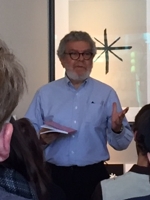Poems by Richard Levine
Archives: by Issue | by Author Name

Bittersweet
by Richard Levine
Richard lives a few miles from the mouth of the Hudson River, which flows out through estuarial waters to the Atlantic. He lives even closer to Prospect Park, which contains one of the highest points in Brooklyn.

All along the horizon, first
light began redrawing the fine
line between earth and sky
and warm and cold seasons.
And as we once sensed a future
and moved toward it together,
an arrowhead of geese straightened
toward the target-round rising sun.
Those that stay will have to endure
frosts and foul weathers, with no
guarantee that the return of song
birds and leaves will find them better.
Our gardens are all harvested
and put to bed well fed. And with
no more assurance than bushels
and jars of food, we’ll drive south.
The last of falling leaves and geese
cleaving time will fill our rearview
mirror, adjoining all bittersweet.
It’s a fine morning to stay or leave.
© Richard Levine
The Flood That Saves the World
What sort of science is it that enriches the understanding
but robs the imagination?
– Henry David Thoreau
by Richard Levine
From Canary Spring 2016

In April, rains reign; winter-knit ice melts.
For days, gray ranges glaciers across the sky,
their sustained dome over mountains helping
submerge the wood in brine-green light and dye.
Dark trunks, post and brindle the wet gloam,
like pier piles under green crowns and cloud tide.
Treasure’s buried everywhere in this loam,
the world’s composted rot, rich and alive,
so I wade in open to all signs shown.
Though I walk knowing that science has pried
open the metaphors and secret names
of air and magnetic orbits, whose tides
lure birds back a-wing and awaken game,
hibernating in boles, burrows and nesting,
stir sap, blood and seed the season’s one claim:
this is the flood that saves the world each spring,
that weds to primal reason unlike parts.
Here I find the ancient poems of living,
whose figured senses aloud were first art,
whose stanzas of wonder made sense of being.
Before methods and measures and pie-charts,
we were child-smart, trusting our sensing,
joy and fancy, figuring animals
from clouds and shepherds from wind herding
them. In morning mists, we saw pine spires tall
as ship masts and made harbors in the sky,
roiling seas from waving leaves, and through squalls
and gusts of as or like the storm’s calm eye.
© Richard Levine